In last week’s newsletter, I wrote about finishing Oliver Burkeman’s book 4,000 Weeks: Time Management for Mortals. I loved its central message of accepting our limitations—not the least of which is the limited time we all have in this place—as a way of living more freely and more meaningfully. In particular, I loved the sentiment with which Burkeman ended his book:
And the life you will see incrementally taking shape, in the rearview mirror, will be one that meets the only definitive measure of what it means to have used your weeks well: not how many people you helped, or how much you got done; but that working within the limits of your moment in history, and your finite time and talents, you actually got around to doing—and made life more luminous for the rest of us by doing—whatever magnificent task or weird little thing it was that you came here for.
It has me reflecting on what “magnificent task or weird little thing” I came here for and goes well with Austin Kleon’s “Be the weird you wish to see.”
It also has me wondering about how limitations can counterintuitively liberate us in other areas of life. On this topic, Kleon too, has something to say. In the final chapter of his book Steal Like an Artist—titled “Creativity Is Subtraction”—he writes:
Nothing is more paralyzing than the idea of unlimited possibilities. The idea that you can do anything is absolutely terrifying.
The way to get over creative blocks is to simply put some constraints on yourself. It seems contradictory, but when it comes to creative work, limitations mean freedom.
I’ve recently started following Erik Winkowski’s newsletter Paper Films, which I find to be wildly creative. When I think about using constraints as a way of unleashing creativity in your work, Winkowski’s short films immediately come to mind. For example, a few weeks ago he posted a video showing how he uses a typewriter to draw.
It’s hard to imagine a more constrained way of drawing than doing so on a typewriter.
Kleon also employs the humble typewriter as a limiting tool for his own creative work. He conducts his excellent typewriter interviews via the U.S. Postal Service, a constraint in its own right. In today’s hyperconnected world, the time it takes to type up interview questions, mail them out, wait for a response, and post the results serves as a limiter that brings Kleon’s creative work and collaborations into focus. It’s the good friction.
He also popularized blackout poetry—a form of found poetry in which you remove, or “black out,” words of a newspaper or other text to create your own unique composition.
One of Kleon’s predecessors in this type of work was the visual artist Tom Phillips. In 1966, Phillips decided to take W.H. Mallock’s 1892 novel A Human Document and modify every page through his beautiful paintings and collages with the goal of creating an entirely new work of art—blackout poetry taken to the extreme. Phillips’s commitment to the project would produce his magnum opus: A Humument. Over the course of 50 years, A Humument saw various publications and modifications, the latest version coming out in 2016, just six years before Phillips passed away. Every page of this beautifully unique and impressive book is graciously available for viewing on Thomas Phillips’s website.

In the end, Winkowski, Kleon, and Phillips have all used limitations as a way of freeing themselves to pursue and define their life’s work. In doing so, they’ve carved out their own creative niche—their own unique voice, their own version of weird.
I think we need limitations in life. There’s definitely a time for pushing yourself beyond your limits, but when life seems complicated, I always find it helpful to simplify. If I ever feel stressed out, this mantra always helps to ground me: “Keep it simple.” This could just as well be, “Find a limitation.” It’s a way of focusing yourself in on what you can actually do now with the tools you currently have.
Setting such limitations ends up teaching you something important—it might even reveal the wings of your real self opening, or the weird little thing you came here for.

